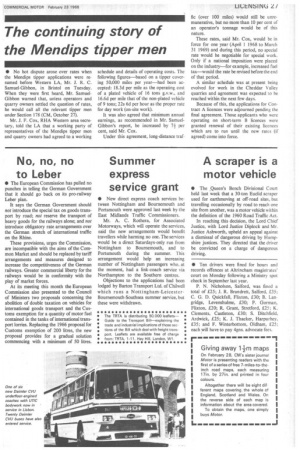The continuing story of the Mendips tipper men
Page 29

If you've noticed an error in this article please click here to report it so we can fix it.
• No hot dispute arose over rates when the Mendips tipper applications were resumed before Western LA, Mr. J. R. C. Samuel-Gibbon, in Bristol on Tuesday. When they were first heard, Mr. SamuelGibbon warned that, unless operators and quarry owners settled the question of rates, he would call all the relevant tipper men under Section 178 (CM, October 27).
Mr. J. F. Cox, RHA Western area secretary, told the LA that a working party of representatives of the Mendips tipper men and quarry owners had agreed to a working
schedule and details of operating costs. The following figures—based on a tipper cover ing 50,000 miles per year had been accepted; 18.3d per mile as the operating cost of a plated vehicle of 16 tons g.v.w., and 16.6d per mile that of the non-plated vehicle of 9 tons; 22s 6d per hour as the proper rate for day work (on-site work).
It was also agreed that minimum annual earnings, as recommended in Mr. SamuelGibbon's report, be increased by 7+ per cent, said Mr. Cox.
Under this agreement, long-distance traf
fie (over 100 miles) would still be unremunerative, but no more than 10 per cent of an operator's tonnage would be of this nature.
These rates, said Mr. Cox, would be in force for one year (April 1 1968 to March 31 1969) and during this period, no special rate would be negotiable for special work. Only if a national imposition were placed on the industry—for example, increased fuel tax—would the rate be revised before the end of that period.
A similar schedule was at present being evolved for work in the Cheddar Valley quarries and agreement was expected to be reached within the next few days.
Because of this, the applications for Contract A licences were adjourned pending the final agreement. Those applicants who were operating on short-term B licences were granted renewal of their existing licences which are to run until the new rates (if agreed) come into force.










































































































